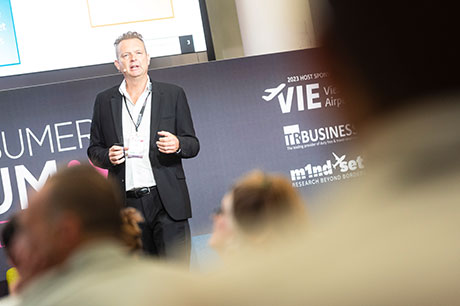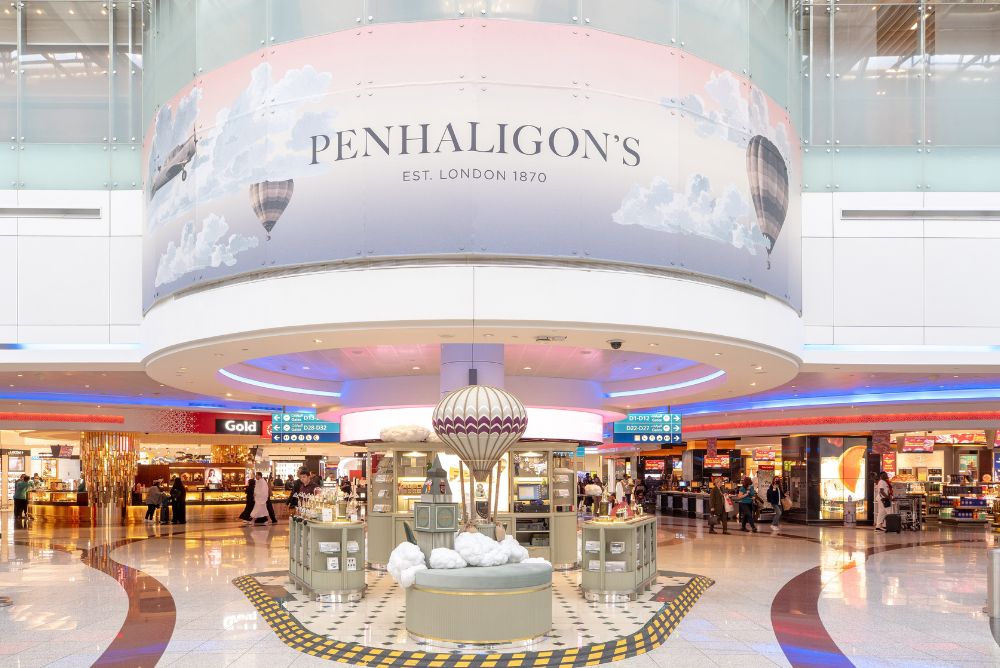TRConnect Covid-19 webinar questions answered; Peter Mohn, CEO m1nd-set
By Charlotte Turner |
 As reported, TRBusiness received a tidal wave of cross-industry support for the inaugural Travel Retail Connect (TRConnect) Covid-19 webinar, which aired on 5 May.
As reported, TRBusiness received a tidal wave of cross-industry support for the inaugural Travel Retail Connect (TRConnect) Covid-19 webinar, which aired on 5 May.
The 75-minute session hosted at 14:00 CET attracted 899 registrations, with just over 500 permitted to watch live [to view a repeat of the webinar, click below].
Entitled, ‘Emerging Stronger in a Post-Covid World’, the first showing in TRBusiness’ series of incisive, thought-provoking webinars struck to the root of what is a multi-faceted topic and as viewers discovered, one with many converging opinions.
During a dynamic Q&A session, panellists agreed to address unanswered questions at a later date. We can now provide the answers to those questions submitted to m1nd-set Founder and CEO, Peter Mohn below.
Where was the questionnaire conducted and when? Who was the audience and how many people were included?
Peter Mohn: The research was conducted among 1,500 international travellers from over 50 nationalities, covering all regions of the world. We only recruited people who travelled in last six months through over 60 different airports. We conducted online interviews between 1-15 April 2020 with m1nd-set’s unique database of travellers recruited at departure gates at airports around the world
From your consumer research do you believe that some categories will recover faster and immediately start to drive revenues for retailers vs other categories considered more luxury or ‘add on purchases’? For example, tobacco offers the highest saving in any duty free store and is a destination category.
The majority of travellers will be careful with the money they spend on shopping when they start travelling again, so we strongly believe that actions such as heavy and clear promotions/saving vs home country or online will drive purchases.

Peter Mohn’s excellent consumer insights presentation made at the first TRConnect Webinar prompted a huge number of questions during the session and after.
There will also be a stronger tendency to stick to brands and products travellers are familiar with or used already in the past, so tobacco has quite some advantages in this sense, if shoppers can find their regular brand in the DF&TR shops.
We also believe that whether a category will recover faster or not is strongly correlated to the ability to deliver a real advantage, or better ‘perceived’ advantage compared to other channels; especially vs online, which is gaining a considerable relevance.
Also, we will see in our next survey we conduct (in June) whether there will be a category shift in priorities when it comes to allocation of budget and making a purchase in the first place.
Given the usual level of conversion in TR ranging from 1-40% depending on channel, what do we think is the best way for us to attract and engage, and then convert a higher percentage?
We will cover this topic in more details during the next TR Connect seminar on 2 June, but overall customer engagement will see a shift from personal and physical interactions to more digital touchpoints, especially including virtual and augmented reality. Overall, creative and interactive displays and activations will have a significant impact on conversion rates.
Forty-one percent willing to visit duty free shops; this does not appear to be different from pre-covid-19 data does it?
Indeed, this 41% willing to visit the DF shop is very encouraging. Please take into consideration that this a projection of how people think (right now) they will behave in the future, once they can travel again.
We have identified that there will be a proportion of shoppers who will be looking to ‘revenge shop’ after they were prevented from doing so for an extended period of time. However, others will be more careful about how they spend their money on shopping in the near future. Consequently, it is a huge opportunity for the TR/DF industry, but all players have to be sensitive about meeting the new needs of the shoppers, ideally by offering a clear value advantage compared to other channels, or by being more creative and inspiring.
How much do you think people’s expectations and concerns are changing? As country specific restrictions change, will sentiment change also? and therefore how often should we be asking these questions?
Sentiments and expectations will surely change as a consequence of the many concerns after the Covid-19 outbreak. Overall, we can see that a vast majority of people are relatively insecure about hygiene issues, new rules and regulations, and this is permanently changing. It is also dependent on different cultures and how much people trust their governments. We think that these questions should be asked on a continual basis by all industry players in order to make sure we, as an industry, adapt the offer in a post-Covid-19 world. M1nd-set has indeed been conducting several studies since the virus outbreak to track changes and expectations in travel and shopping behaviour.

M1nd-set shared exclusive insights that illuminate clearly the sea change taking place in future shopping behaviours prompted by Covid-19. Click to enlarge.
What are the differences between European and Asian passengers?
In general, the research shows that Asians are a step ahead regarding the willingness to move on and to start travelling again in the near future. Europeans are clearly more hesitant and sceptical at the moment, but this will change in the next 2-3 months. We do think that many Europeans will want to start travelling again in the summer, especially during the July/August period, but will try to avoid crowded places. They will prefer to be more surrounded by nature and will stay clear of busy city centres. We expect many airlines to gradually start international flights again from 1 July.
In this specific global research, we didn’t deep dive into differences between nationality regions. We however fully understand the need and we will indeed conduct a syndicated research in June among 2,5000 international travellers where we will be able to differentiate between AsPac travellers (N=700), Chinese (N=500), European travellers (N=500), Americas travellers (N=500) and Middle Eastern/African travellers (N=300).
In the research we will look into different topics such as; travel habits once international bans will be lifted: e.g. plans for next international trips (e.g. immediately, in the first 3 or 6 months, after 6 or 12 months etc.). We will also be able to differentiate between frequent and infrequent travellers as well as business vs leisure. The survey will also deep dive into reasons to reduce travelling for both purposes.
The data about travel intentions is claimed and would depend on a lot of factors. How can we ensure to capture real data as it happens?
Unfortunately, the situation is extremely unstable and evolves on a daily basis so for now we are tracking consumer intentions, willingness to travel again and claims regarding the future prospective in term of shopping behaviour.
The moment people will be able to jump back on a plane again, we will surely be ready to catch ‘real’ data. However, we think that consumers/travellers/shoppers intentions and expectations already provide a very good indication and guidance of the direction in which the industry should move.
Do you think there will be a shift to buying inflight vs at airport? Will pre-order for personalised delivery (rather than waiting in a queue) onboard would be more attractive to customers?
We did not cover inflight shopping directly in this research. However, based on other m1nd-set research, pre-ordering seems to become more and more appealing to the majority of travellers, especially when items are pre-ordered online before the trip and delivered directly at the gate. Also, the possibility of virtual shopping during the flight via the inflight entertainment system is becoming an increasingly interesting alternative for travellers. We think the traditional ‘buying from the trolley’ on the plane will decrease even more in the future post Covid-19 due to inconvenience and hygiene concerns.
Do you think F&B will be exclusively takeaway and how do you see F&B adapting to this new reality?
We do not forsee that F&B will be exclusively takeaway as travellers’ confidence is coming back and if F&B establishments at the airport follow the safety rules and regulations, we believe passengers will be more and more willing to eat in restaurants before their flights. In more good news, among the top priorities for travellers – who have shared where they will allocate most of their time and spending on future trips – is dining and eating. If the airports’ F&B providers adapt well to the new normal, they can be successful, but it will most likely take at least 9-12 months before the majority will feel comfortable.
What are your expectations for volume recovery in duty free in Asia? When could we expect things to go back to ‘normal’ in your point of view?
It will take time, but volume will come back. A very encouraging example is the fact that in Beijing some downtown duty free shops, the Chinese have already started their ‘revenge shopping’, equipped with face masks and gloves. So recovery has already begun (slowly) and we are confident it will continue in this direction. From our point of view, we expect shopping rates in tobacco to be back to normal in 12-18 months from now.
When do you expect Asia to open up?
We expect international flights in Asia to start picking up again slowly in Q3, and hopefully Q4 will see travels up to 50% compared to Q4, 2019.
Alcohol insights: Conversion up, spend down in Q4
Conversion of visitors in the alcohol category in duty free has risen to 54% in Q4 2023,...
Heinemann Asia Pacific makes breakthrough in New Zealand at AKL
Heinemann Asia Pacific is set to enter the New Zealand market with three new retail concepts at...
Men buy and spend more in travel retail says new research by m1nd-set
Men have a higher conversion rate and spend more when shopping in travel retail, says new...
-
 International,
International,Alcohol insights: Conversion up, spend down in Q4
-

-


In the Magazine
TRBusiness Magazine is free to access. Read the latest issue now.

 Trbusiness. The travel retail Trbusiness. The magazine for global retail and duty free professionals.
Trbusiness. The travel retail Trbusiness. The magazine for global retail and duty free professionals.






















